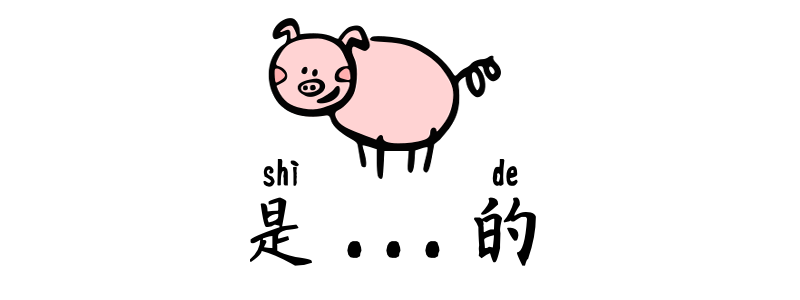Grammar Point:
The 是 shì … 的 de structure in Chinese is used to provide strong affirmation. It is often used to clarify or emphasize a point or to make a statement more assertive. It is similar to the way English speakers might stress the word “is” in a sentence.
When to use it?
- Emphasizing something will or will not happen
- Talking a job in a casual way
- Indicating Purpose or Intent
What do I need to know?
- To negate this structure, always place 不 bù before the adverb not before the 是 shì.
- In this structure, the use of 是 shì is mostly optional. The only time when 是 shì is necessary in this construction is when negating it. Apart from that, it is often left out.
- For questions, you can only place 吗 ma at the end. 是不是 shìbúshì doesn’t work in this structure.
Structure
是 + 能, 會/会 or 可以 + Verb + 的
This pattern emphasizes that something will or will not happen, or should not happen.
語言不練習,(是)會退步的语言不练习,(是)会退步的
Language skills will regress if not practiced.
這個網站(是)可以幫助你學中文的这个网站(是)可以帮助你学中文的
This website can help you learn Chinese.
如果你願意動手術,這個病(是)能治好的如果你愿意动手术,这个病(是)能治好的
If you are willing to undergo surgery, this illness can be cured.
你幫了我那麼多忙,我是不會忘記的你帮了我那么多忙,我是不会忘记的
I won’t forget that you’ve helped me so much.
芒果的皮是不可以吃的,我暈芒果的皮是不可以吃的,我晕
You can’t eat the skin of a mango, My Gosh.
FYI
我晕 wǒ yūn is a fun way to express surprise or shock in informal conversations or social media in Mainland China. This phrase can be translated to “I’m dizzy” or “I’m stunned” in English. The use of 晕 yūn in this context is similar to the feeling of being lightheaded or dizzy due to a sudden change in circumstances, being caught off guard by something unexpected, or expressing disbelief in a humorous way.
你不找人合作,這個報告你是能一個人做完嗎?你不找人合作,这个报告你是能一个人做完吗?
You are not collaborating with anyone. Are you able to finish this report alone?
S + 是 + Job + 的
This pattern is an informal way to talk about what kind of work people do.
我是教中文的我是教汉语的
I teach Chinese.
他是賣水果的他是卖水果的
He sells fruits.
我爸爸是修馬桶的我爸爸是修马桶的
My dad fixes toilets.
你呢?你是做什麼的?你呢?你是做什么的?
How about you? What do you do?
People + 是 + 來/来 or 去 + 的
When expressing a purpose or intent, 是 shì and 的 de are often used together with 来 lái or 去 qù.
我是來台灣學中文的我是来台湾学汉语的
I came to Taiwan to learn Chinese.
他是去加拿大工作的他是去加拿大工作的
He went to Canada to work.
你是來學校學習的,不是來交朋友的你是来学校学习的,不是来交朋友的
You came to school to study, not to make friends.
Thing + 是 + 用來/用来 + 的
When expressing a purpose, 是 shì and 的 de are often used together with 用来 yònglái, especially when the subject is a thing.
那個杯子是用來喝紅酒的那个杯子是用来喝红酒的
That cup is for drinking red wine.
這個網站是用來給你們學中文的这个网站是用来给你们学汉语的
This website is for you to learn Chinese.
這些錢是要用來買房子的这些钱是要用来买房子的
This money is for buying a house.


